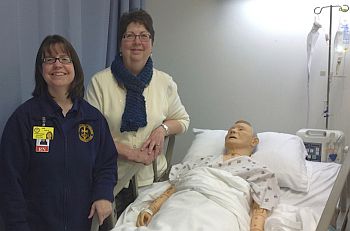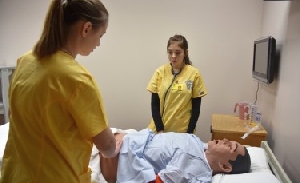
 Padraig Marshall, Ancilla College’s new simulation technician, was an LPN medic for a combat unit of the U.S. Army.
Padraig Marshall, Ancilla College’s new simulation technician, was an LPN medic for a combat unit of the U.S. Army.
Marshall now runs Ancilla College’s, iStan, patient simulator. Considered to be the most advanced wireless patient simulator available, iStan helps nursing students at the two-year, private college complete patient care scenarios with no risk, said Nursing Division Chair Ann Fitzgerald.
“Stan can bleed, shout out in pain and open and close his eyes,” she said. “Our students can diagnose a problem and give Stan the treatment he needs. Or, if students do not react appropriately, he can die.”
Fitzgerald said she is delighted to welcome someone with Marshall’s experience to the school’s simulation lab. But student clinicals are only a few days a week, so that mean Stan gets lonely, she said.
Marshall has a solution. Stan can be used to provide continuing education to the health care community.
“We’d like to invite health care providers to use iStan to train or retrain their staff. We can rent him out by the simulation to local companies with staff who may need additional or remedial training,” Marshall said. “This partnership can be beneficial for the college because we make more use of our equipment and we can also really help area facilities, health care providers, businesses and other nursing schools.”
Marshall said iStan training at Ancilla College will save providers money instead of doing training in-house themselves, often on real patients. Additionally, most health care workers are required to do 20 hours of extra or remedial training each year to remain certified and iStan simulations at Ancilla College can count toward that. Marshall will be certified to provide Continuing Education Credits (CEUs) this March.
”Anywhere that a nurse works, Stan can help them. It is easier to re-train someone than to hire somebody else,” Marshall said.
The simulator allows Marshall to set up challenging patient scenarios and guide students through the patient care process. They get hands-on experience with everything from wound care, to bedside communication, to participating in a full code, without the risk of harming a real person, he said. Sometimes nursing students in clinicals are pushed aside and don’t get experience with specific situations until they are on the job. The simulator allows nursing students to experience the stress of working with a real patient in a critical situation.
Allowing nursing students to experience a critical, life-and-death simulation helps them remain calm when they are dealing with a real patient who is in trouble or unable to explain their situation to you. Marshall said when he was in the Army, he would be told, “Ok, your patient is 200 yards that way.” Then he would have to find iStan, who might be bleeding and missing a limb, and bring him back to the med station to begin treatment and call in a helicopter. “Meanwhile, they’re firing blanks over your head. After I got out, I don’t think there’s anything that’s flustered me quite like that,” he said.
Ancilla College does not offer battlefield situations, but iStan becomes very real for students. “They’re gonna feel stress so that stress becomes normal and they are able to provide the patient care required,” he said.
Fitzgerald encourages area health care providers to contact the Division of Nursing and Health Sciences at Ancilla College. “We’re not charging for the use of iStan or for our wages, just for the consumables,” she said. Likely, the cost will be per simulation, probably a few hundred dollars, and for as many as four to six people.














